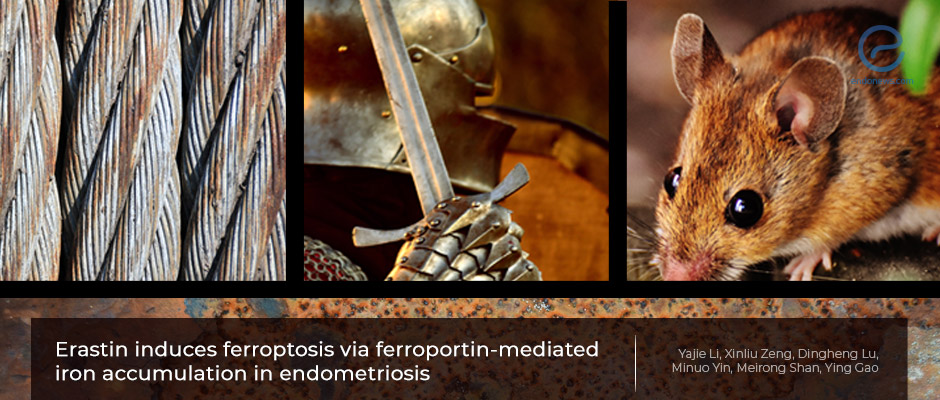Erastin, Ferroptosis and Endometriosis
Apr 14, 2021
Could Erastin Activate Ferroptosis to Regress Endometriotic Lesions?
Key Points
Highlight:
- Dr. Gao group from Jinan, China suggests that "erastin" may serve as a potential therapeutic treatment for endometriosis.
Background:
- Iron overload has been linked to endometriosis; ectopic lesions have abundant free iron and high oxidation.
- Iron overload activate NF-kB signaling and activate proinflammatory signaling in endometriosis.
- The imbalance of iron homeostasis enhances endometriosis development.
- Ferroptosis is characterized by iron-dependent cell death which is triggered by erastin.
Key points:
- Overall, 21 women with endometriosis and 11 women without endometrioses have participated in this study.
- Compared to normal endometrial stromal cells, "endometriotic stromal cells" were more sensitive to erastin treatment by significant increase in reactive oxygen species.
- Shorter and condensed mitochondria, indicating ferroptosis, were observed by electron microscopy in "endometriotic stromal cells" with erastin treatment,
- In erastin administrated mouse group, the size of endometriosis reduced, without any side effects.
Conclusions and Limitations:
- Dr. Gao group demonstrated that erastin induces "endometriotic stromal cell death" through ferroptosis using in vitro system.
- Administration of erastin significantly size of reduces endometriosis lesions in mouse model.
- The effect of erastin was low on the enormal ndometrium stromal cells.
- However, more molecular studies are required to understand underlying mechanisms.
Lay Summary
Iron overload has been linked to endometriosis. There are abundant free iron and high oxidation in ectopic lesions, probably due to retrograde menstruation. Interestingly, iron overload in endometriosis activates NF-kB signaling and results in proinflammatory communication. More clear pieces of evidence support that the imbalance of iron homeostasis enhances endometriosis development.
Ferroptosis is characterized by iron-dependent, lethal lipid peroxidation accumulation. This iron-dependent cell death is found to be triggered by a small molecule named "erastin". Until now, the effect of ferroptosis and erastin in endometriosis has not been investigated yet.
In this paper, Dr. Gao group from China evaluates if erastin could be a potential treatment of endometriosis by triggering ferroptosis. This paper was recently published in the journal “Human Reproduction”.
For the study, 21 women with endometriosis and 11 women without endometriosis have participated. Primary endometriotic stromal cells were isolated and tested in vitro with erastin. Compared to normal endometrial stromal cells, ectopic endometrial stromal cells were more sensitive to erastin treatment by increasing oxydative stress levels significantly. This effect was iron-dependent because it was attenuated by iron chelators. Ectopic endometrial stromal cells with erastin treatment had shorter and condensed mitochondria by electron microscopy.
To further explore the erastin effect, the authors used endometriosis mouse model and observed that erastin reduced the endometriosis lesion size without significant side effect. These findings together suggest that erastin is capable to induce ectopic endometrial stromal cell death by ferroptosis.
Dr. Gao group demonstrated that erastin induces ectopic endometrial stromal cell death through ferroptosis using in vitro system. Administration of erastin significantly reduced endometriosis lesions in mice. However, more molecular studies are required to understand underlying mechanisms.
"Our findings reveal that erastin may serve a potential theraeutic treatment for endometriosis" concluded the researchers.
Research Source: https://pubmed.ncbi.nlm.nih.gov/33378529/
Endometriosis Ferroptosis Erastin Iron accumulation

